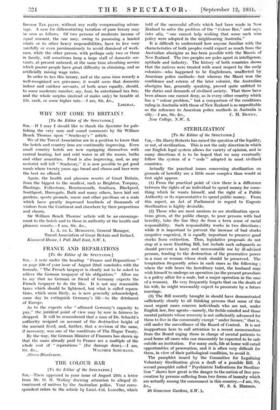STERILIZATION
[To the Editor of the SPECTATOR.] SIR,—Dr. Harry Roberts has raised the question of the legality, or not, of sterilization. This is not the only direction in which our English legal system allows for variety of opinion, and in many directions it is to be hoped that we may eventually follow the system of a " code " adopted in most civilized countries.
Actually the practical issues concerning sterilization on grounds of heredity are a little more complex than would at first sight appear.
(1) From the practical point of view there is a difference between the rights of an individual to spend money for some- thing which he wants himself, and the right of a Public Authority or its representative to spend public money. From this aspect, an. Act of Parliament in regard to Eugenic Sterilization is highly desirafile.
(2) Those who are most anxious to see sterilization opera tions given, at the public ,charge, to poor persons with bad heredity, take the line they do from a keen sense of racial responsibility. Such responsibility works in two directions ; while it is important to prevent the increase of bad stocks (negative eugenics), it is equally important to preserve good stocks from extinction. Thus, legislative proposals. do not stop at 'a mere Enabling Bill, but include such safeguards as should prevent a hasty and unreasonable use by ill-advised persons, tending to the destruction of the procreatiVe power in a man or woman whose stock should be preserved. The temptation frequently arises in such cases as the following ; where the wife bears the hereditary taint, the husband may wish himself to undergo an operation (as the present procedure is a paltry affair for a male, but a major operation in the case of a woman). He very frequently forgets that on the death of his wife, he might reasonably expect to procreate by a future marriage.
(3) The Bill recently brought in should have demonstrated sufficiently clearly to all thinking persons that some of the, most urgent cases concern individuals who are not, under English law, free agents—namely, the feeble-minded and those mental patients whose recovery is not sufficiently advanced for them to live in the community except " under licence," that is, still under the Surveillance of the Board of Control. It is not inopportune here to call attention to a recent memorandum from the Board urging those in charge of mental patients to send home all cases who can reasonably be expected to be 'safe outside an institution. For many such, life at home will entail opportunities of procreation, and it is often very difficult for them, in view of their pathological condition, to avoid it.
The pamphlet issued by the Committee for Legalizing
Voluntary Sterilization -gives a draft of a possible Bill. A second pamphlet called " Psychiatric Indications for Steriliza- tion " shows how great is the danger to the nation of free pro- creation by persons suffering from two forms of insanity which are actually among the commonest in this country.—I am, Sir, &c., W. S. S. HODSON. 20 Grosvenor Gardens, S.W. 1.






























 Previous page
Previous page